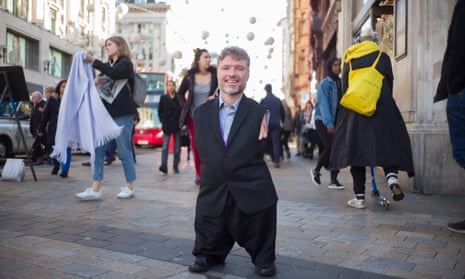Going shopping makes Mike Adams feel “very disabled”. He says: “I can go into a shop and be made to feel invisible. There’s an apprehension. Staff are unsure of engaging with me so they swerve the conversation altogether.”
Tough times on the high street mean the big retail chains are crying out for customers, yet Adams – the founder of Purple, a not-for-profit organisation that promotes the spending power of the UK’s near 14 million disabled people – argues that shops are badly serving a £249bn market.
Adams was behind this week’s “Purple Tuesday”, which saw stores and shopping centres festooned in the signature colour of the disability rights movement.
Purple’s initial target was to get 50 companies to each make a new long-term commitment to improving the experience of disabled shoppers. But by the time the day itself came around, that figure had reached 700.
The event was designed to “demonstrate to retailers that there are things that can be done at no cost” and to “start some momentum for businesses to see disabled people as, first and foremost, customers,” says Adams.
Asda, Marks & Spencer and Sainsbury’s, as well as Hammerson and LandSec, the owners of shopping malls including the Bullring in Birmingham and Bluewater in Kent, were among the big names involved.
Hundreds of thousands of shop workers received training via a specially devised customer service video. Other new commitments included to host “quiet hours” in stores, add “not every disability is visible” signs and to run accessible facilities checks.
Nearly one in five people in the UK has a disability or impairment, and more than half of households have a connection to someone with a disability.
As part of Purple Tuesday the organisers asked firms to conduct accessibility audits in stores and on their websites, and to appoint internal “disability champions” to raise issues at a board level in big firms.
Adams, who is able to walk short distances but relies on a wheelchair, says physical access remains an issue for him. “I never go on the tube [in London] because not all the stations have lifts. Many stores have wheelchair access now, which is great, but it’s when you get inside the difficulties can start, with crowded layouts making it very difficult to get around without damaging anything.”
The rise of online shopping means the number of visitors to Britain’s high streets is in decline but Seema Flower, the founder of the consultancy Blind Ambition, which champions disabled entrepreneurs, says the physical experience is preeminent for her.
“People says the internet is brilliant, but for the disabled and visually impaired it’s not – because we like to feel and touch things,” says Flower, who has been blind since she was a child. “I can’t appreciate the visual quality of a website. When I’m buying a handbag I like to smell the leather and feel how heavy it is.”
Flower also rejects the idea that disabled people do not like to look good: “There is an assumption that if someone is registered disabled they are on benefits and unable to afford nice things. I like glamorous blingy stuff with Swarovski crystals on it. I like to look good.”
Despite progress in some areas, there is still a long way to go and not just for high street retailers. When the design agency Sigma carried out a mystery shopping exercise in the leisure sector this summer, it found a quarter of businesses could not accommodate a wheelchair while and a third were unable to assist with cognitive impairments like autism.
“Initiatives such as Purple Tuesday are a fantastic step forward,” says Hilary Stephenson, the managing director of Sigma. “However, inclusion should be an everyday consideration – it’s not enough to simply be inclusive for one day a year and leave it at that.”
The actor and disability campaigner Samantha Renke, who has osteogenesis imperfecta, says her high street experience can still be “atrocious”. “It can be very traumatic and humiliating, particularly when the staff don’t know how to help or don’t offer help,” she says.
Renke’s worst experiences include being unable to pay because the till counter was out of reach (“the assistant just shrugged at me”) and finding that accessible changing rooms are doubling as cupboards. “Retailers need to look at attitudinal barriers,” she says. “You don’t need to rearrange the whole shop. Train staff how to communicate and ask, ‘how can I help you?’”










